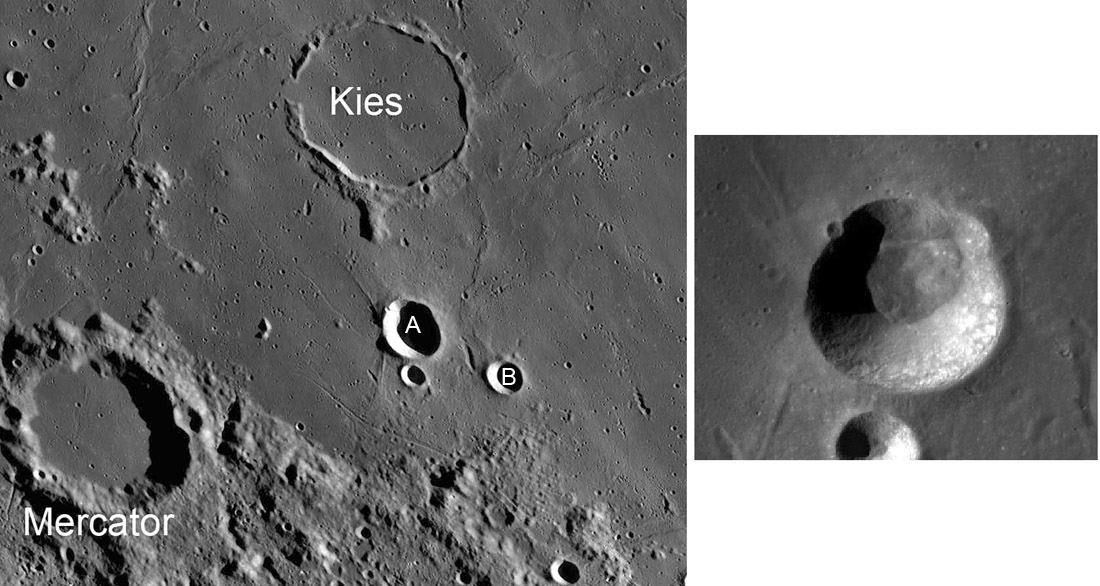Difference between revisions of "December 19, 2011"
| (8 intermediate revisions by 2 users not shown) | |||
| Line 1: | Line 1: | ||
__NOTOC__ | __NOTOC__ | ||
=Single Crater Septum= | =Single Crater Septum= | ||
| − | + | <!-- Start of content --> | |
<!-- ws:start:WikiTextHeadingRule:0:<h1> --> | <!-- ws:start:WikiTextHeadingRule:0:<h1> --> | ||
<!-- ws:start:WikiTextLocalImageRule:6:<img src="/file/view/LPOD-Dec19-11.jpg/287252184/LPOD-Dec19-11.jpg" alt="" title="" /> -->[[File:LPOD-Dec19-11.jpg|LPOD-Dec19-11.jpg]]<!-- ws:end:WikiTextLocalImageRule:6 --><br /> | <!-- ws:start:WikiTextLocalImageRule:6:<img src="/file/view/LPOD-Dec19-11.jpg/287252184/LPOD-Dec19-11.jpg" alt="" title="" /> -->[[File:LPOD-Dec19-11.jpg|LPOD-Dec19-11.jpg]]<!-- ws:end:WikiTextLocalImageRule:6 --><br /> | ||
<em>left: image from LRO WAC mosaic, and right: close-up of Kies A from LRO WAC [http://target.lroc.asu.edu/da/qmap.html Act-REACT Quick Map]</em><br /> | <em>left: image from LRO WAC mosaic, and right: close-up of Kies A from LRO WAC [http://target.lroc.asu.edu/da/qmap.html Act-REACT Quick Map]</em><br /> | ||
<br /> | <br /> | ||
| − | While looking at the wonderful nomenclature [http://lpod. | + | While looking at the wonderful nomenclature [http://www2.lpod.org/wiki/December_4,_2011 map] Maurice Collins constructed with the LRO WAC mosaic I noticed a strange curved ridge |
| − | tangent to Kies A. It immediately reminded me of a similar curved ridge or septum between [http://www.lpod.org/?m=200611 Plato K and KA.] This latter case is explained | + | tangent to Kies A. It immediately reminded me of a similar curved ridge or septum between [http://www.lpod.org/?m=200611 Plato K and KA.] This latter case is explained |
| − | as being created by converging ejecta from two simultaneously formed craters, but Kies A is just a single crater, although its shape is non- | + | as being created by converging ejecta from two simultaneously formed craters, but Kies A is just a single crater, although its shape is non-round. So I found a higher Sun LROC WAC view from the Quick Map - thanks ASU/NASA for two different mosaics! - that doesn't suggest |
| − | round. So I found a higher Sun LROC WAC view from the Quick Map - thanks ASU/NASA for two different mosaics! - that doesn't suggest | + | two almost completely overlapping simulataneous craters. There is a small scallop on the northeast side where a collapse removed a small |
| − | two almost completely overlapping simulataneous craters. There is a small scallop on the northeast side where a collapse removed a small | + | bite from the rim. Then I remembered a second case of a similar single crater arc at Cauchy. Cauchy is a perfectly normal circular crater so |
| − | bite from the rim. Then I remembered a second case of a similar single crater arc at Cauchy. Cauchy is a perfectly normal circular crater so | + | the curved ridge does not require an unusual crater to form. I [http://www2.lpod.org/wiki/May_31,_2009 wonder] if an oblique impact could produce such a curved septum? Neither |
| − | the curved ridge does not require an unusual crater to form. I [http://lpod. | + | Cauchy nor Kies A is young enough to preserve rays to provide evidence for non-vertical impacts. Danny Caes had actually mentioned both |
| − | Cauchy nor Kies A is young enough to preserve rays to provide evidence for non-vertical impacts. Danny Caes had actually mentioned both | + | Kies A and Cauchy in an LPOD comment in 2009 and he wondered if there were more of them, which is still a good question. Finding more |
| − | Kies A and Cauchy in an LPOD | + | examples might lead to clues as to their origin. |
| − | examples might lead to clues as to their origin.<br /> | + | <br /> |
<br /> | <br /> | ||
<em>[mailto:tychocrater@yahoo.com Chuck Wood]</em><br /> | <em>[mailto:tychocrater@yahoo.com Chuck Wood]</em><br /> | ||
<br /> | <br /> | ||
<strong>Related Links</strong><br /> | <strong>Related Links</strong><br /> | ||
| − | Rükl plate [ | + | Rükl plate [https://the-moon.us/wiki/R%C3%BCkl_53 53]<br /> |
<br /> | <br /> | ||
<hr /> | <hr /> | ||
| + | <p><b>Yesterday's LPOD:</b> [[December 18, 2011|Continuing Discovery]] </p> | ||
| + | <p><b>Tomorrow's LPOD:</b> [[December 20, 2011|The Pacific View]] </p> | ||
| + | <!-- End of content --> | ||
| + | {{wiki/ArticleFooter}} | ||
Latest revision as of 07:25, 28 October 2018
Single Crater Septum

left: image from LRO WAC mosaic, and right: close-up of Kies A from LRO WAC Act-REACT Quick Map
While looking at the wonderful nomenclature map Maurice Collins constructed with the LRO WAC mosaic I noticed a strange curved ridge
tangent to Kies A. It immediately reminded me of a similar curved ridge or septum between Plato K and KA. This latter case is explained
as being created by converging ejecta from two simultaneously formed craters, but Kies A is just a single crater, although its shape is non-round. So I found a higher Sun LROC WAC view from the Quick Map - thanks ASU/NASA for two different mosaics! - that doesn't suggest
two almost completely overlapping simulataneous craters. There is a small scallop on the northeast side where a collapse removed a small
bite from the rim. Then I remembered a second case of a similar single crater arc at Cauchy. Cauchy is a perfectly normal circular crater so
the curved ridge does not require an unusual crater to form. I wonder if an oblique impact could produce such a curved septum? Neither
Cauchy nor Kies A is young enough to preserve rays to provide evidence for non-vertical impacts. Danny Caes had actually mentioned both
Kies A and Cauchy in an LPOD comment in 2009 and he wondered if there were more of them, which is still a good question. Finding more
examples might lead to clues as to their origin.
Chuck Wood
Related Links
Rükl plate 53
Yesterday's LPOD: Continuing Discovery
Tomorrow's LPOD: The Pacific View
COMMENTS?
Register, Log in, and join in the comments.



